And it’s a bumper version this week, with a lot of really interesting new data, a super-critical TEF response from the Royal Statistical Society and we continue the speculation on fees and funding and Brexit.
Mental Health
Damian Hinds, Secretary of State, for education has launched a new taskforce to help students with the transition to University within these areas:
- independent living (budgeting, cooking, managing living independently)
- independent learning
- healthy relationships (including new peer groups)
- general wellbeing
The taskforce will be known as the Education Transitions Network and Universities UK, the Association of Colleges, OfS, NUS, Student Minds, and UCAS are all expected to be involved. Sky news covers the announcement. UUK have a blog from UWE’s VC, Steve West, on supporting students through the transition and risk factors. This excerpt highlights resources available:
The more that universities can do to get students prepared before they arrive, the better. Student Minds, in partnership with Southern Universities Network, has published a guide to the first few weeks of term, designed to help students prepare through workbook activities and practical case studies. At UWE Bristol we have developed an enhanced induction programme for new students, which signposts available support and includes a new parent and carer advice section on our website, to advise on how best to support loved ones while at university.
And Wonkhe have several blogs to contribute to University Mental Health Day:
Universities Minister, Chris Skidmore, has been tweeting about a mental health charter with Student Minds and acknowledge the student voice is essential as universities look to improve the provision from student mental health. Welsh Education Minister, Kirsty Williams, announced £2 million new funding for Welsh Universities to support mental health initiatives. And there is new guidance out on preventing student suicides.
IFS report on the cost of HE
An IFS report was issued on 4th March on the cost of different degrees. There’s an IFS blog here with the predictable headline “Creative Arts degrees cost taxpayers 30% more than engineering degrees”. It’s long but it is complicated and important, so worth setting out in some detail (sorry):
These are among the results of new analysis which for the first time estimates the distribution of government spending, taking account of grants and unrepaid student loans, across subjects studied and institutions attended. It is important to understand these are not estimates of returns to the different degrees: some subjects and institutions may therefore receive large loan subsidies even if they are positively impacting the earnings of their graduates, because they happen to attract students that have very low earnings potential. Since the final costs will depend on actual earnings over the next 30 years, there is inevitably uncertainty about these estimates. But they are based on new administrative data giving precise details on actual earnings of previous cohorts of graduates and are likely to be the best estimates possible at the current time.
Our main findings include:
- There is considerable variation in loan subsidies by subject. For many subjects the government expects to write off around 60% of the loans it issues. For economics, however, write-offs are likely to be just a quarter of loans issued and for medicine and dentistry only a fifth. For creative arts, write offs are likely to amount to around three quarters of the value of loans issued. This variation in loan subsidies is primarily driven by differences in repayments rather than differences in loan sizes.
- The highest government spend typically goes towards graduates of the subjects with the highest loan write-offs, as loan write-offs account for more than 90% of total government spending on undergraduate HE. The cost to government is around £11,000 per economics student who borrows from the government to help with tuition fees and maintenance loans, while it is more than £35,000 per creative arts borrower. Medicine is an exception – despite its graduates repaying most of their loans, it is one of the highest-cost subjects, at £45,000 per borrower, due to large teaching grants.
- The government cost per student also varies by institution type. While total funding received by universities is extremely similar, the government contribution per student at each institution varies massively. Each borrower at Russell Group institutions – where graduates are typically high earning – costs the government less than £25,000. Costs are more than 20% higher for ‘post-1992’ and ‘other’ universities, where the average graduate earns much less.
- The reforms since 2011 have shifted the allocation of spending from high-cost degrees to those with the lowest graduate earnings. Spending per borrower on students doing economics and engineering degrees is likely to have fallen by around £8,000 as a result of reforms between 2011 and 2017, while increasing by more than £6,000 for creative arts degrees. Similarly, spending on borrowers at Russell Group universities – which tend to offer more high-cost subjects – has fallen by £6,000, while increasing by more than £2,000 for borrowers at ‘post-1992’ and ‘other’ universities.
- Consequently, the share of total government spending on science, technology, engineering and maths (STEM) courses has fallen from 57% to 48% as a result of policy changes between 1999 and 2017. If we had the 1999 system in place today, only 30% of spending would go to arts and humanities (AH) subjects. Under today’s system, this figure is 37%, and roughly 13% of the £9 billion the government spends on HE per cohort now goes to creative arts courses.
The report also considers what these figures mean for policy options:
- Lowering the fee cap from £9,250 to £6,000 could give the government more flexibility to target spending. This would free up around £7,000 per borrower to be targeted more directly towards priority areas, with the savings coming mostly from subjects that have low-earning graduates. Any cuts to tuition fees would, however, benefit the highest-earning graduates most.
- Variable fee caps would be another option to regain flexibility in targeting spending. Reducing the fee cap for AH subjects to £6,000 would reverse some of the increase in funding these subjects have seen over the last couple of decades. This policy may, however, increase demand for those courses, or perversely reduce funding for STEM achieved through within-university cross-subsidisation.
- One policy that might resolve some of these issues would be for government to charge universities a fee for charging tuition fees above a certain level in areas where it wants to reduce spending. A ‘negative teaching grant’ of £3,000 for AH courses would mean government allocates less money to those courses, without affecting the fees students face or their repayments. Savings could be targeted towards priority areas. However, the impact on, and responses of, universities are unpredictable.
You can find the full report here.
It is important to keep in mind that this variation in government subsidy is not the same as variation in funding levels. This is because graduates also contribute to the cost of their education by repaying their student loans. Once this is accounted for, the variation in overall funding per university is very small due to the lack of variation in tuition fees.
Fees & Funding – what is the state of play?
With the Chancellor’s Spring Statement due on 13th March, which might give more detailed timing for the Comprehensive Spending Review (he said “summer” on Radio 4 on 7th March), we thought it would be helpful to summarise the state of play…like Brexit, this is getting harder and harder to call….although the IFS report noted above will no doubt be considered carefully.
We don’t know when we will know more, because the advisory panel chaired by Philip Augar, originally due to report in November 2018, has delayed its report again – the latest official statement is “Spring” – which could be anytime from now (according to the Met Office, although 21st March is the usual first day of Spring) to June. Research Professional suggest June and cite a BBC insight that it the final outcome could be in the Autumn.
One of the challenges is that this is a two stage review – the “independent” advisory panel report and then the DfE led review itself. The final DfE report (in the form perhaps of a green or white paper, accompanied by a consultation) will be when we see what the outcome really might be.
Philip Augar has said that he wants to make recommendations that will be accepted (presumably by the department/government, rather than the sector?) and it may be getting that consensus which is causing the delay. Research Professional today report that there is a draft doing the rounds in government but not everyone likes the recommendations.
The timing of other things is important – when it was originally announced, the Augar recommendations were due in November 2018, with the final report due out by the end of March – even at the time that sounded unlikely given the coincidence with the UK leaving the EU. Now of course Brexit may be delayed until May or June, and the effort involved in Brexit may be one of the reasons for the delays with the review. It has also been suggested that the government may be waiting because they want some big policy announcements to make after Brexit.
The most relevant dependencies are linked to government funding priorities. The outcome of any review of fees and funding needs to be affordable. The terms of reference say “its recommendations must be consistent with the Government’s fiscal policies to reduce the deficit and have debt falling as a percentage of GDP”. The first delay to Augar was because of the Office for National Statistics review of accounting for student loans that came out in December 2018 (You can read about this in more detail in our analysis in the HE policy update for the w/e 21st December 2018). The latest delays may be linked to the Chancellor’s Spring statement (due on 13th March 2019 – a day when other things are happening). But the Spring statement is only a holding position – partly because Philip Hammond has said it might all change depending on what happens with Brexit, and partly because the real story about spending is the comprehensive spending review. This is a full review of all government spending but the dates have not been confirmed. They may be confirmed as part of the statement on 13th March.
All this matters because while there are lots of other things at stake, including the “young vote” and perhaps more importantly, the votes of parents and other contributors to student budgets and the government’s social mobility agenda, this review is largely driven by money. Many have called for investment in FE, in support for disadvantaged students and, in particular, for maintenance grants. Against the other pressures on the economy, and a narrative of bad news about the sector (grade inflation, pay differentials, free speech, poor quality courses etc.), an overall increase in investment in HE looks unlikely. The ONS accounting changes on student loans don’t change the cost of HE but they increase its visibility in the deficit.
So just a quick reminder – what are the possible recommendations of Augar and/or the final DfE report, whatever form it takes?
Tuition fee cuts – widely trailed as a leak from Augar, repeated again last weekend. Apparently the original figure that Augar will propose of a cap on tuition fee loans of £6500 a year has been increased to £7500 because of sector resistance. Such a cut would be likely to have far reaching consequences in terms of services and SSR. It might mean drastic cuts in spend on WP activities, now financial targets will not form part of the OfS review of access and participation. It could mean changes to the profile of programmes offered across the sector as institutions abandon high cost subjects in favour of lower cost subjects, increasing competition in these areas at a time when we are still approaching the bottom of a demographic dip (and when EU student numbers are falling).
Of course there might be top ups. If they happen at all they would almost certainly be conditional. They might be linked to certain subjects or meeting access or other targets. They might be linked to student outcomes (defined in terms of employment, probably), or to regional needs (such as value add in regions of low employment or access). It may be that there would be continued support for STEM subjects, for example, or additional grants to institutions seen to be making a substantial difference to their regional economy by helping social mobility. After all, the terms of reference for the review say that it must “support the role of universities and colleges in delivering the Government’s objectives for science, R&D and the Industrial Strategy”.
It might be that employers could provide top-ups to the capped fees – directly to institutions or through some sort of centrally organised fund. Again, if organised centrally, this funding would most likely be conditional – probably linked to certain subjects and outcomes. If done directly it would essentially mean growth in employer sponsored degrees. There is a real conflict with the apprenticeship agenda there – how do employers choose? And how do small and medium sized businesses get involved?
Student numbers cap/limit – another way to reduce long term costs is to reduce numbers. The terms of reference for the Post-18 review rule out a direct cap on numbers. But there are other ways of doing it. Alleged leaks about the proposal to stop students with grades lower than DDD at A-level from accessing student loans have been widely discussed. See our policy update for 21st December 2018 when this story first broke. Current comment includes a blog from Nick Hillman on the HEPI website.
The headline focusses on A levels. Many students enter HE with other qualifications. Unless, as some have commented, there is a plan to not only have a floor on a-level results but also say that only students with A-levels can go to university then there would have to be an equivalent system for BTECs and other qualifications. Messy but surely possible. Given the government focus on technical education, it is not impossible that they would try to force more people down a technical route – but using entry to university as a lever would surely have the opposite effect, pushing students back to A-levels, at least in the short term if only to keep their options open.
The big focus has been on how this (like a reduction in the fee cap) would be bad for social mobility. It is also potentially bad for some universities with a large proportion of lower-grades students – ironically, these are likely to be the universities with a big impact on their region and on social mobility. This sort of rationing as social engineering just doesn’t seem to make sense, but of course it plays well with those who like to talk about “mickey-mouse courses”, “bums on seats”, and “too many people at university” – whose conclusion is usually that “other people’s children should do technical qualifications”.
So what next?
- The Minister was on Twitter over the weekend to say: “Worth stating today that the Augar post-18 review is an independent one which will reach its independent conclusions. We will then consider these when published—working with HE/FE sectors on an evidence-based approach to deliver a joined-up post-18 education landscape.”
- He went on to say: “But I have always been clear that the government’s priority is to ensure that we focus efforts on widening participation and access, across all communities and WP groups, centred on value and outcome for the learner journey. We want to build bridges—not pull up drawbridges.”
So back to where we started – we don’t know what or when. But the story will run and run and provide a distraction from Brexit in the meantime…
And more lobbying on fees
Alistair Jarvis (Chief Exec) wrote a UUK blog expressing his belief that Augar is finished – but awaiting a good launch date:
- “I have good reason to believe that the ink is rapidly drying on the Augar panel’s recommendations, though the date of publication of the report itself is subject to the ongoing vicissitudes of political events.…when parliamentarians and educational experts judge the panel’s recommendations it must be on the basis of what is most likely to enable Britain to thrive, not on political ideology or electoral expedience. With Brexit mere weeks away, and our collective economic future uncertain, the country simply cannot afford to risk damaging universities, our most reliable source of innovation, skills and global connections.”
He goes on to say there are five tests that can be applied to the Augar recommendations – all of which highlight elements of strength, excellence or aspiration within the current HE system. In short the tests are:
- Whether Augar’s proposals will enhance or impede access to HE (widening participation and social mobility) – whereas the talk of reintroducing student number caps or perhaps a minimum DDD grade threshold would create access barriers
- Graduate skills gaps – Jarvis argues Universities need to expand and provide more highly skilled workers, not cut back and downsize.
- The combination of in-depth subject knowledge, co and extra curricular provision, 1:2:1 academic support, online learning, engagement in current research, all backed by robust regulatory system are strengths that should be maintained. “Cutting the fee level, without a commitment to make up the shortfall with public funding, will see bigger class sizes, poorer facilities, and less advice, support and choice for students.”
- Cuts will hit the local communities and civic life: “Any MP knows intimately how their local university is woven through the fabric of civic life, contributing to health, sport, culture, charitable endeavour and local economic growth. Much of this activity is not formally funded; universities do it because it matters and because they have a responsibility to their local community. In areas where traditional industries have declined the university is always at the heart of regeneration efforts, providing the research, innovation and skills to stimulate business growth and attract external investment”.
- Students should be free to make their own choices on what to study and where “Our current system is shaped by students’ choices by design. To suggest that a civil servant in Whitehall knows better than a prospective student what sort of course they should study and where, is clearly nonsense…fundamentally we should respect and support students’ choices – as it is they who will have to live with the consequences.” Jarvis does go on to acknowledge that IAG could be better, and the funding system needs to be clearer.
During this week’s Science and Technology Committee session examining the work of the Universities Minister Skidmore responded that any reduction in fees for universities would have to be mitigated through alternative measures and the voice of universities properly heard.
Meanwhile the Stephen Hammond, Minister of Health and Social Care, remains adamant nursing bursaries will not return:
- The Government has no plans to reinstate the bursaries for nursing degrees and is committed to increasing uptake of the additional places these reforms have made available.
- The intention of the funding reforms was to unlock the cap which constrained the number of pre-registration nursing training places, and to allow more students to gain access to nurse degree training courses, creating a sustainable model for universities and securing the future supply of homegrown nurses to the National Health Service. In support of the reforms, we announced additional clinical placement funding to make available 5,000 more nurse training places each year from September 2018 and 3,000 more midwifery training places over the next four years.
- Students on the loans system are at least 25% better off than they were under the previous bursary system. In recognition of the additional costs that the healthcare students incur in order to attend the mandatory clinical placement, the Government introduced the Learning Support Fund, a £1,000 per student, per year for child dependent allowance, reimbursement of all travel costs above their usual daily travel and up to £3,000 per year for exceptional hardship. These payments are in addition to the allowances on the student loans system.
- On 7 February, the University and College Admissions Service published full-time undergraduate nursing and midwifery applications made by the 15 January deadline. This data showed a 4.5% increase in applicants to undergraduate nursing and midwifery courses at English providers. We are working with Health Education England and the university sector to ensure students continue to apply for these courses this year and in future years.
TEF, metrics and more
As you are aware, last week was a big week for TEF as the call for views closed. You can read more in our policy update for w/e 1st March here.This week we have seen more about the metrics used for TEF.
The Royal Society of Statistics wrote an explosive submission., which builds on their previous submissions to the year 2 and subject level consultations (there are links in the document), which they say have been largely ignored. They say:
- the TEF “appears to transgress…the..UK Statistics Authority Code of Practice for Statistics
- the data is potentially deceptive and misleading for students – it should be communicated to students that “the TEF is observational in nature and that TEF differences are likely not solely due to teaching quality differences”
- “The use of the same TEF award, and the same TEF logo, for all types of university seems highly misleading. The literature and communication around TEF should make it clear that TEF awards are not comparable across the board.”
- the presentation of data in the TEF and the way that is benchmarking may encourage game playing by universities (eg to improve their metrics)
- the TEF benchmarking is flawed from a statistical point of view and many flags will have been awarded incorrectly “far too many flags are being raised, erroneously alerting the downstream human TEF panels to effects that are just not there. Our conclusion is that the previous TEF awards are not valid”
- It shouldn’t be called TEF because it doesn’t assess teaching quality [that’s an old chestnut, but one that Dame Shirley will hear a lot]
- And this: “TEF also does not appear to capture the time series nature of teaching quality. We have made this point previously in our consultation responses. What is the evidence to say that a teaching quality mark now will result in a student getting a good experience in several years’ time?”
- TEF is oversimplifying the data, in a way which is unhelpful – and misleading. Students should be able to assess the detailed data themselves on a more granular basis through a revamped unistats. “…. It might be argued that the TEF’s philosophy that distils diverse institutions into three categories, underestimates the intellectual ability of prospective students and other stakeholders”
Some more detailed quotes below because they really are worth reading:
On uncertainty:
- Ultimately, the RSS judges it to be wrong to present a provider/subject as Gold/Silver/Bronze without communication of the level of uncertainty. The current TEF presentation of provider/subjects as Gold, Silver, Bronze conveys a robustness that is illusory. A prospective student might choose a TEF Silver subject at one provider instead of a TEF Bronze at another institution. If they had been told that, statistically, the awards are indistinguishable, then their choice might have been different and, in that sense, TEF is misleading.
- The uncertainty is likely to be higher for subject-level assessment than for provider-level assessment….
- Accurate and coherent uncertainty assessment is also vital to understand the value and cost-effectiveness of the TEF. If it turns out that the uncertainty swamps the mean level award (Gold, Silver, Bronze), then this calls into question whether it is even worth continuing with the TEF.
On comparability
- Is a TEF Gold at one university the same as TEF Gold at any other university? The answer has to be no. …Statistically, TEF Gold at one institution can not necessarily be compared with TEF Gold awarded to another. This is potentially deceptive and misleading for stakeholders, particularly students…The use of the same TEF award, and the same TEF logo, for all types of university seems highly misleading. The literature and communication around TEF should make it clear that TEF awards are not comparable across the board.
On benchmarking
- We are extremely worried about the entire benchmarking concept and implementation. It is at the heart of TEF and has an inordinately large influence on the final TEF outcomes. (i) The RSS has referred to benchmarking in the past as a ‘poor person’s propensity analysis’…. differences in TEF metric scores might be due to unobserved characteristics unrelated to teaching quality. So, attributing the differences to teaching quality is unscientific and wrong
- TEF benchmarking does not include important characteristics such as amount of course content, diversity (in its broadest sense) or difficulty/challenge of material. Surely, this has an enormous effect on what is measured? This seems wrong in itself. We are concerned that omissions of this sort will lead to game playing by institutions. One might improve NSS scores, for example, by ‘dumbing down’ the syllabus and there is strong anecdotal evidence that this is already happening in the sector. (Indeed, OfS already has evidence of unexplained grade inflation which might be evidence of ‘dumbing down’ or related behaviours. How much of this is stimulated by exercises such as TEF or NSS?)
- …At Dame Shirley’s listening session, the RSS enquired of the DfE/OfS representatives whether multiple testing without adequate size control was occurring and the answer seemed to be yes. Since this seems to be the case, then this lack of overall size control is a serious statistical mistake and means that many (previous) TEF flags should not have been so flagged.
Transparency and reproducibility
- At a minimum, we would expect the entire TEF data process pipeline to be published, including as much data that can be released ethically. We have reports of people (in and outside the RSS) trying to understand the TEF data release, but find the accompanying instructions impenetrable. There is a lack of transparency, which is fuelling a perception of lack of integrity.
Conclusions
- Fundamentally, do the metrics input to TEF measure quality of teaching? Do the provider submissions measure teaching quality? We are sceptical. There may be some distant indirect association, but what robust research been carried out to assess this? Alternatives might be to rename TEF (to remove ‘teaching excellence’), or actually carry out some evaluation of teaching quality (which would be expensive).
- We do think it is useful for students to see the metrics that underpin TEF, relating to their potential course choice. The Unistats website already does this and seems to be useful and well-used by potential students. The RSS could imagine an upgraded Unistats site containing well-chosen and well-communicated metrics being valuable for prospective students and other stakeholders.
Continuation data
And HESA have published experimental data about continuation, one of the metrics used in TEF. As we have written before, non-continuation is linked to a whole lot of different factors, but in the TEF of course the implication is that students leave because the course is poor quality or they do not believe that carrying on will make enough difference to their employment prospects afterwards.
Arthi Nachiappan and David Kernohan from Wonkhe have helpfully looked at the data to see what it says about who leaves HE. Of course there are interactive data views to play with too.
- We tested a common variation on the above theory – that non-continuation rates are lower at the Russell Group and higher at post-92 institutions due to the latter taking higher proportions of first degree young undergraduate students from low participation backgrounds…
- Among Russell Group institutions, students who didn’t continue were more likely than average to transfer to another provider than to leave higher education altogether. Russell Group institutions tended to have a lower proportion of students from low participation backgrounds than the average provider, but non-continuation rates for those students from low participation backgrounds at Russell Group universities tended to be lower than 8%.
- The equivalent figure for post-92 institutions is in the range of 5-20%. When we look at students from other backgrounds, this range narrows to between 4 and 12% at post-92 institutions, while at the Russell Group it is between 1-7%, but generally – with the exception of Queen Mary University of London – below 4%. The proportions of those from low-participation backgrounds who do not continue in their studies is higher at both groups of institutions than the equivalent figures for students from other backgrounds.
- ….But any idea that alternative providers are currently reaching students that would otherwise not access HE, much less offering them a successful student experience, should be abandoned.
They also look at subject level:
- … the overall rate for all students leaving computer science (for instance) is 9.8%. But among students who enter following a HE foundation course, the rate is 4.2%. What students come in with is a huge predicting factor of their course outcome.
- Among students entering with at least some tariff points, mass communications and documentation sees the largest percentage of non-continuation (20.40%), but the largest number of students not completing their course (6,341) are on social studies.
- For those with BTECs – to give another example – the subject area with the largest number of non-completions is biological sciences (5,738), but the subject area with the highest percentage of non-completions is engineering and technology. The overall preferred subject of study for BTEC students is business and administration.
And what’s next?
- … once again it is Damian Hinds rather than Chris Skidmore that supplies our comment. Inflammatory “bums on seats” language will do little to endear him to the sector, and once again the threats of Office for Student action are wheeled out.
- His substantive point is unlikely to surprise anyone: “No student starts university thinking they are going to drop-out and whilst in individual circumstances that may be the right thing, it is important that all students feel supported to do their best – both academically and in a pastoral sense. Today we have announced a new taskforce to help universities support students with the challenges that starting university can involve, but universities need to look at these statistics and take action to reduce drop-out rates.”
Apprenticeships
It’s been National Apprenticeships Week with lots of news and releases. The Federation of Master Builders published their survey which states that (marginally) more parents in the UK want to see their child undertake an apprenticeship than a university degree.
- 25% preferred their children to undertake apprenticeship
- 24% preferred their children to study a university degree
- 50% had no preference
Brian Berry, Chief Executive of the Federation of Master Builders (FMB), said: “We’re finally seeing the shift in attitudes with more people understanding the value of undertaking a vocational apprenticeship rather than a university degree. For too long, apprenticeships were looked down on and seen as the alternative route if children weren’t bright enough to follow the more academic route. With university fees in England going through the roof, and with apprenticeships offering an ‘earn-while-you-learn route to a meaningful job, it’s no wonder that the penny has finally dropped.”
These findings contrast (slightly) with the Sutton Trust findings below (note these only asked about degree apprenticeships – parents seem to be preferring the traditional degree model rather than a degree apprenticeship for their children with the capability to study at this level).
The Sutton Trust surveyed parents (with children aged 5-16) about on degree level apprenticeships. Key Findings:
- 27% said they would advise their child to take a degree level apprenticeship over a universities degree course, with 31% indicating they would make the opposite recommendation, Of which:
- 68% intimated that this was because they believed it offered better career prospects, whilst 29% said it was because they lacked knowledge about apprenticeships in general
The National Audit Office published a report assessing the apprenticeship programme considering whether it provides value for money, addresses poor productivity, and employer investment in training. It wasn’t great news for the Government. Key conclusions:
- The DfE has not set out clearly how it measures whether the programme is boosting economic activity
- Since funding reforms were introduced, apprenticeship starts have fallen substantially.
- Employers are not using the apprenticeship levy to pay for new apprenticeships (just 9% of funds used, £191 million of the available £2.2 billion)
- The average cost of training an apprentice is double what was expected, as employers are choosing more expensive standards at higher levels than expected. This could inhibit the growth in the number of apprenticeships once frameworks are withdrawn and all apprenticeships are on standards.
- To meet the target of 3 million new apprenticeships by March 2020, the rate of starts would need to double for the remainder of the period
- The Department’s targets for widening participation among under-represented groups lack ambition and levels of apprentices from the most disadvantaged areas are actually going down.
- The introduction of standards has increased the number of higher-level apprenticeship starts, and the trend looks set to continue. But its not all good news some levy paying employers are replacing professional development programmes with apprenticeships – meaning no additional value to the economy.
- Inspection grades are still low with many inadequate or requiring improvement and the 20% off the job training rule doesn’t appear to be adhered to across the board.
Just a few of the most relevant recommendations:
- The Department should set out clearly how it measures the impact of the programme on productivity, and indicate the level of impact that it is aiming to achieve.
- The Department should strengthen the programme’s performance measures relating to participation among under-represented groups.
- The Department and the ESFA should assess whether they would secure better value for money by prioritising certain types of apprenticeship, rather than delivering a programme for apprentices at all levels, in all sectors.
Matthew Fell, CBI Chief UK Policy Director, said: Today’s report confirms what employers already know – that the Apprenticeship Levy is not yet working as intended and is holding back the Government’s welcome efforts to modernise the skills system. Companies are committed to apprenticeships, so what’s needed now is a second wave of reform. The Government must use its review of the apprenticeship levy to work with business and the sector to build a system that supports, rather than frustrates, employers offering a first step to people in their career.’
The OfS have released one of their Insight Briefs on degree apprenticeships to try to raise awareness and increase both supply and demand for degree apprenticeships. This link also has the data on level 6 and 7 apprenticeship starts (2017/18) and this looks at the disadvantage profile of young apprentices on higher level apprenticeships. The chart below highlights that as the level of apprentice rises more places are taken up by the more advantaged students (quintiles 4 and 5).
Research
Research Professional have an interesting article on the government’s plans to prepare for the impact of no-deal Brexit on research.
- With three weeks to go before Brexit day, the UK government is in talks to create an international research funder to mitigate the loss of access to the coveted European Research Council….As reported by Cristina Gallardo, a project to craft a UK-based global research agency is being led by Adrian Smith, director of the Alan Turing Institute, the UK’s national centre for data science. …In the spirit that hard problems are not to be shirked, today’s Playbook draws attention to three questions that will be high on Team Smith’s list of considerations.
- Size matters How much funding should researchers expect? That’s the billion-pound question and one in which UKRI chief executive Mark Walport, BEIS secretary Greg Clark and chancellor Philip Hammond have shares. According to data compiled by the Royal Society, in the previous European Framework programme (2007 to 2013), the UK received €1.67 billion in ERC grants, around a fifth of the entire budget. The UK also received just over €1bn in Marie Skłodowska-Curie grants, a quarter of the total. Former Royal Society president Paul Nurse reiterated last week that the UK receives between £500 million and £1bn more in European grants annually than the government puts into the EU science budget, and he isn’t confident that this extra funding will be replaced. Assuming that the government pays separately for the UK to associate to eligible parts of Horizon Europe, the new global fund should still be worth at least in the region of €350m to €400m annually, and likely more if it also absorbs the Global Challenges Research Fund and what remains of the Newton Fund….
- Housing decisions We know that the new funding agency cannot be a like-for-like replacement for the ERC, as it is designed to support UK-international collaborations. But that prompts questions about its institutional home and its organisational architecture. It will almost certainly sit inside UKRI. But what happens if UKRI chooses to reduce or streamline its nine-council structure? …A permanent home will take time to decide on. In the interim, BEIS and UKRI could potentially extend their relationship with outside bodies such as the British Council and the British Academy. ..
- What price autonomy The ERC’s great attraction for researchers—something that the UK fought hard to achieve—is that it is both generous with its funding and unashamedly investigator-led. Nick Talbot, a plant geneticist at the University of Exeter, told us in an interview that his success in obtaining an ERC Advanced Grant was down to his track record as a scientist and the power of his idea—not necessarily the foremost criteria for conventional grant schemes. But we’re in a vastly different world from 2004, when Ian Halliday, then chief executive of the Particle Physics and Astronomy Research Council, was happy to remark: “There is an awful flavour in Europe of: ‘Let’s give everybody something.’ It has to be possible for the best guy in Cambridge to run away with all the money.” It isn’t possible today to establish a funding agency without proper regard to equality of opportunity, diversity and inclusion. Funders can no longer disregard the importance of place as well as public engagement in how they make decisions. Creating a wholly new research funding body in the midst of the Brexit drama presents plenty of challenges and it should not be rushed. The chance to create a global research funding agency doesn’t turn up every day.
Universities Minister, Chris Skidmore, responded to a parliamentary question to highlight the Government’s hopes for Horizon Europe:
- The Department has worked closely with UKRI and engaged with wide range of stakeholders on no deal planning for the Horizon 2020 programme. This includes via the High Level Group on Science and Research. Further updates will be provided on Horizon 2020 no deal planning in due course.
- The Government remains committed to ongoing collaboration in research and innovation and wants to work with the EU on a mutually beneficial outcome beyond 2020. The Government wants to have the option to associate to Horizon Europe, depending on the outcome of negotiations.
- In the event that the UK does not associate to Horizon Europe, the Government is committed to continuing to back UK researchers and innovators by supporting measures to enable world-class collaborative research, including support for small businesses. We will be seeking independent advice from Sir Adrian Smith on these measures.
He also includes research within his top priorities when he spoke within the Committee meeting that scrutinises his work:
- Skidmore informed the committee that the UK was rated one of the most innovative nations in the world and was home to three of the world’s top ten universities. He argued that 2019 was a critical year for science and innovation due to Brexit and the CSR. It would be pivotal to establish a clear roadmap that demonstrated where public investment would be made as well as demonstrating how private investment would be leveraged to reach the new target of research and innovation spend at two-point four percent of GPD.
He went on that
- …it was important to maintain close ties with European institutions after Brexit, including participation in programmes such as Horizon 2020, Euratom and the European Space Agency.
- His priorities, Skidmore advised the committee, were to ensure maximum certainty on relationships with Europe, ideally through a deal on Brexit, meeting the target of 2.4% spend and to maintain strong international collaboration.
Meanwhile Sir Patrick Vallance, Government Chief Scientific Advisor, who was also examined informed the committee that he had been focused on [amongst other work] improving the absorptive capacity of science among policy makers. Perhaps good news for those academics hoping Parliament will take their research on board within policy development.
SUBU says: Gender in HE – graduate outcomes
Here’s the latest from SUBU’s Sophie Bradfield.
As its International Women’s Day, it’s interesting to take a brief look at gender in Higher Education; specifically graduate outcomes. There are lots of factors that can influence outcomes and this update only looks at gender, but when you add characteristics such as ethnicity or disability alongside gender, the picture changes again.
First a caveat; I was disappointed when researching data that the most reputable sources only separate graduates by sex and not gender or perhaps they have even confused the two; so on a day where we are actively celebrating gender equality, I’d like to share the Genderbread Person, which is a great infographic to understand the concept of gender and why it’s important that we don’t use it interchangeably with sex.
The number of graduates has increased steadily over the past decade and it is widely known that females are more likely to enter Higher Education than their male counterparts (see UCAS applicant figures). However when looking at the latest Office for National Statistics (ONS) report on Graduates in the UK labour market, the outcomes of female graduates compared to male graduates highlight a disparity in employment attainment after leaving Higher Education.
The research defines a graduate in broad terms as: “a person who is aged between 21 and 64, not enrolled on any educational course and who has a level of higher education above A level standard.” With this definition, it looks at all graduates and not just recent graduates, therefore using a data set of 14 million people in the UK who were graduates from July to September 2017.
Delving deeper into the report, employment rates differ between male and female graduates, with 86% of male graduates in employment compared to 79% of female graduates (figure 13a). Further to this, the research also finds that male graduates are more likely to have high or upper-middle skilled employment (figure 14a). It’s important to note that in this research, high-skilled employment involves use of skill acquired from a degree or equivalent; upper-middle skilled employment involves skills developed from post-compulsory education but not degree level; lower-middle skilled employment involves skills developed from compulsory education with a combination of work experience; and low skilled employment involves skill attained from compulsory education.
The data shows female graduates are almost twice as likely to have lower-middle skilled employment compared to male graduates, which goes some way to explain why the median gross hourly pay differs, with male graduates receiving £17 an hour on average, compared to female graduates receiving £14 an hour.
33% of female graduates work part-time, compared to only 8% of male graduates (figure 14b) and 47% of all part-time workers are employed in lower-middle skilled jobs (figure 14c). The statistics show that the lower-skilled jobs seem to offer more opportunities to work part-time; which is a need that can be influenced by a number of factors including family commitments, which as 11% of female graduates, compared to 2% of male graduates, are ‘inactive due to looking after the family and/or home’ (figure 13b), is a factor which has a greater impact on female graduates than male graduates.
Figure 11 shows that STEM degrees lead to higher salaries and Figure 15b shows that the subjects that lead to the highest average salaries are mainly dominated by male students. According to WISE: “Women make up 23% of those in core STEM occupations in the UK”. Because of this, there are fewer female role models working in these areas and/or going on to teach STEM subjects; something which is vital to move towards a gender-balanced workforce and also increase the earning potential of female graduates.
There are initiatives such as Athena SWAN which seek to address gender equality in Higher Education and you can read more about how this is working in the recent Wonkhe article ‘No more steps. It’s time for a leap on gender equality.’
Ultimately, despite females making up 58% of the overall figure of applicants (see UCAS), they are less likely to apply for the subjects that lead to the greatest earning potential and are also less likely to achieve employment utilising the skills developed from undertaking a degree. This is something that needs to be looked into if we want to achieve this year’s International Women’s Day theme of #BalanceforBetter.
Failing Universities
A new HEPI poll was released showing student attitudes to financial concerns at their institutions
The survey of over 1,000 full-time undergraduate students, undertaken for HEPI by the polling company YouthSight, shows:
- most students (83%) are confident their own institution is in a strong financial position;
- over three-quarters of students (77%) believe government should step in if their university were threatened with closure;
- more than half of students (51%) think fees should be refunded in the event of their university closing, while only one-third (32%) back merger with another institution;
- nearly all students (97%) want to know if their university is in financial difficulty – in contrast with current practice which hides financial problems from students;
- most students (84%) say they would have been less likely to have applied to their university if they had known it was in financial difficulty; and
- the overwhelming majority of students (89%) do not know what Student Protection Plans are, while even more have not seen their own university’s Plan (93%).
Lots of renewed media interest in the financial sustainability of universities and the polling results: BBC, iNews, FE News, and Mail Online.
Brexit
We have a big week coming up for Brexit, maybe, but in the meantime…
The Institute for Government have published a report on Immigration Post-Brexit. This criticises the Government’s “incoherent position” over student migration, with the DfE on the one hand wanting to increase education exports to £30 billion by 2020, but simultaneously counting students in the net migration target. “The policy remains simultaneously to reduce student migration while also wanting to boost it”.
This, from James Blitz in the FT, summarises the position nicely.
The Russell Group are calling on the Government to change their post-Brexit immigration plans as the salary threshold is too high for mid level scientific, teaching and technician posts, and it discriminates against part time posts (many of which are taken up by women). ITV news covers the story.
Student Loans – another way of presenting them
MoneySavingExpert.com and the Russell Group of universities are piloting a proposed redesign of the student loan statement and are calling on parents, students, graduates and those in the higher education sector to test it and give feedback. The consultation runs until 12th March
- MSE and the Russell Group, which represents 24 UK universities, believe that this change should substantially enhance understanding of the student loan system for graduates and their families. We plan to present our findings to Government in the hope it will change the current student loan statements.
- Currently, students simply receive a statement of their outstanding ‘debt’ and the interest that is being added. As an example, a low-earning graduate on a Plan 2 loan (for students in England and Wales who started university after 2012) would receive a statement with £50,000 of ‘debt’ on it, and would see it growing by £1,500 a year in interest. But in reality, a graduate earning under £25,000 would not have to make any repayments at all.
- Instead, the redesigned Plan 2 statement focuses on the actual repayments that students have made, and what they are likely to repay in the future.
You can see a full pilot of the proposed redesign on this link.
Consultations
Click here to view the updated consultation tracker. Email us on policy@bournemouth.ac.uk if you’d like to contribute to any of the current consultations.
Other news
Health dominates part time provision: Wonkhe report that an independent report published by the OfS which tackle part-time provision for underrepresented students finds that allied health subjects are the most prevalent part time subject area. The report argues that decline in participation among part-time students is driven partly by cost of study and partly by lack of provision. It goes on to notes that the proportion of disadvantaged students has remained at around 10 per cent. Wonkhe go on to explore a second independent OfS report focussing on mature allied health students. They highlight that although applications from mature students have declined, enrolments have stayed stable, and the report recommends improvements to information provision and diversification of pathways into allied health courses. As ever, the questions surrounding the decline of part time provision, and the dominant programmes and part time groups remain a question of chicken or egg. It is hard to sort cause and effect out from one another.
Subscribe!
To subscribe to the weekly policy update simply email policy@bournemouth.ac.uk
JANE FORSTER | SARAH CARTER
Policy Advisor Policy & Public Affairs Officer
Follow: @PolicyBU on Twitter | policy@bournemouth.ac.uk



 The British Academy is inviting proposals from UK-based researchers in the humanities and social sciences – active at any career stage – looking to lead interdisciplinary projects in collaboration with colleagues from the natural, engineering and/or medical sciences.
The British Academy is inviting proposals from UK-based researchers in the humanities and social sciences – active at any career stage – looking to lead interdisciplinary projects in collaboration with colleagues from the natural, engineering and/or medical sciences.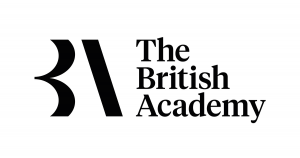 The British Academy is inviting proposals from UK-based researchers in the humanities and social sciences – active at any career stage – looking to develop and lead interdisciplinary projects on questions related to European identities under our programme on The Humanities and Social Sciences Tackling the UK’s International Challenges.
The British Academy is inviting proposals from UK-based researchers in the humanities and social sciences – active at any career stage – looking to develop and lead interdisciplinary projects on questions related to European identities under our programme on The Humanities and Social Sciences Tackling the UK’s International Challenges.

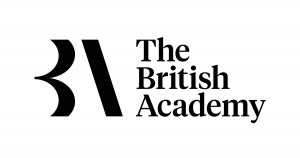 11-12 November 2019
11-12 November 2019
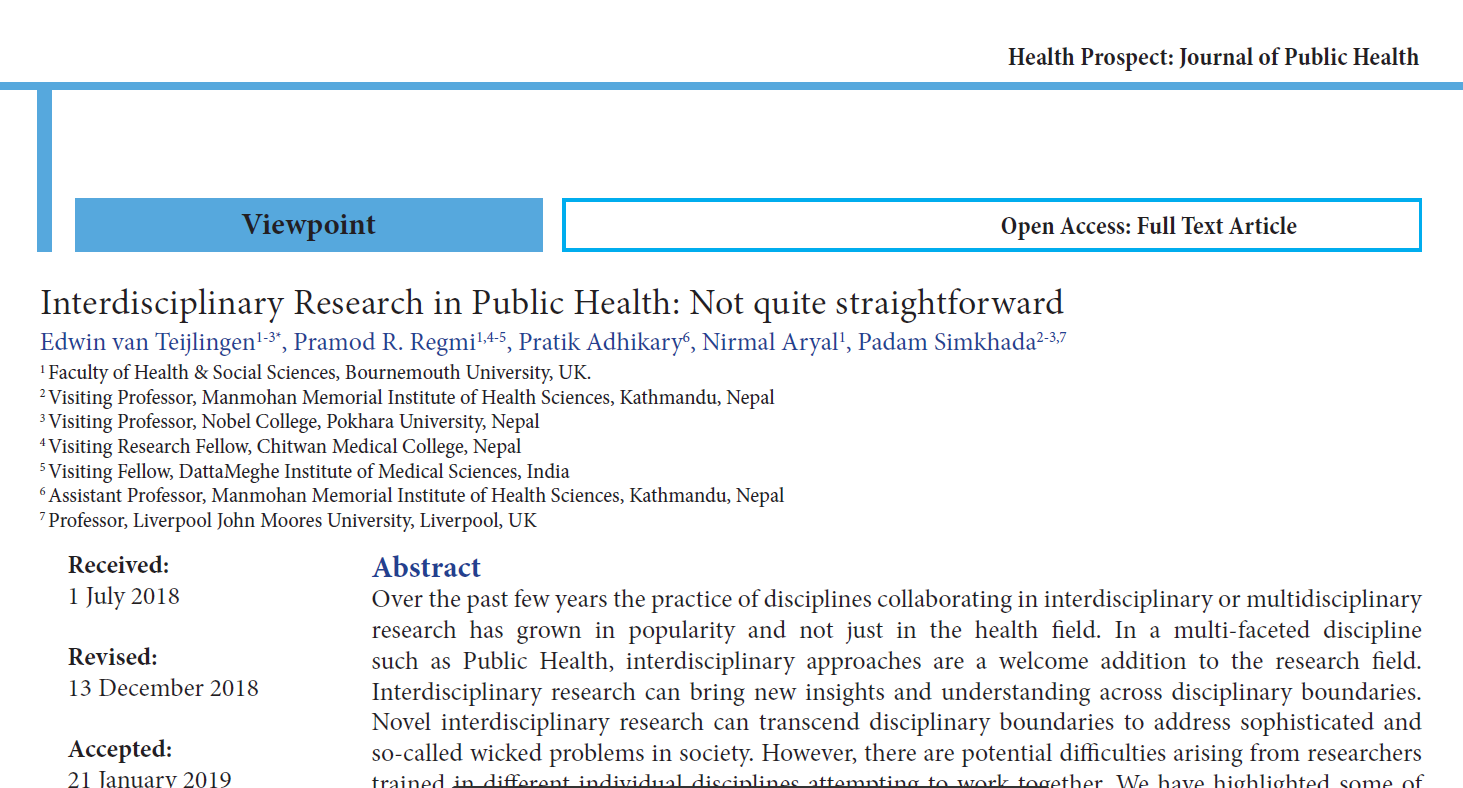

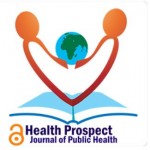


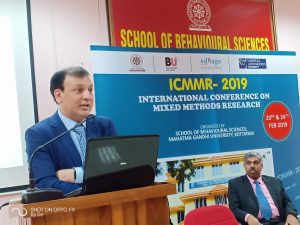



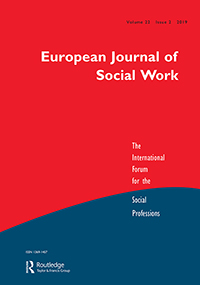











 REF Code of Practice consultation is open!
REF Code of Practice consultation is open! BU Leads AI-Driven Work Package in EU Horizon SUSHEAS Project
BU Leads AI-Driven Work Package in EU Horizon SUSHEAS Project Evidence Synthesis Centre open at Kathmandu University
Evidence Synthesis Centre open at Kathmandu University Expand Your Impact: Collaboration and Networking Workshops for Researchers
Expand Your Impact: Collaboration and Networking Workshops for Researchers ECR Funding Open Call: Research Culture & Community Grant – Apply now
ECR Funding Open Call: Research Culture & Community Grant – Apply now ECR Funding Open Call: Research Culture & Community Grant – Application Deadline Friday 12 December
ECR Funding Open Call: Research Culture & Community Grant – Application Deadline Friday 12 December MSCA Postdoctoral Fellowships 2025 Call
MSCA Postdoctoral Fellowships 2025 Call ERC Advanced Grant 2025 Webinar
ERC Advanced Grant 2025 Webinar Update on UKRO services
Update on UKRO services European research project exploring use of ‘virtual twins’ to better manage metabolic associated fatty liver disease
European research project exploring use of ‘virtual twins’ to better manage metabolic associated fatty liver disease